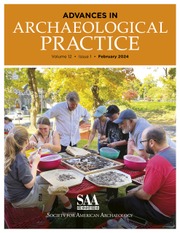Article contents
Red Land/Black Land
Teaching Ancient Egyptian Archaeology through Digital Game-Based Learning
Published online by Cambridge University Press: 16 January 2017
Abstract
While digital games are used for health intervention, language training, and science learning, there are few instances of games being used to teach archaeology. This is a missed opportunity, as narratives of exploration and discovery make archaeology well suited to digital games. This article discusses Red Land/Black Land, a prototype Civilization V mod (modification of an existing game) that allows players to explore both the process of cultural change in ancient Egypt and the construction of archaeological knowledge about ancient Egypt. As a case study of scholarly game design, the article explores the project’s development. Included is a discussion of play mechanics, the merits and process of modding, and the resources required to build games in academic environments. The article also discusses preliminary efforts to test the game in an undergraduate classroom. Ultimately, the article argues that digital games are powerful tools for communicating archaeology. Instead of falling under the glamour of commercial games, however, scholars should adopt cost effective approaches to game design, looking to mobile play, alternate reality games, modding, and browser based games to realize their vision. The article also argues that the actual process of designing a game is an excellent tool to teach archaeology.
Si bien los juegos digitales se han utilizado como parte de las terapias de rehabilitación, en el prendizaje de idiomas o en la enseñanza de la ciencia, existen muy pocos casos en el que los juegos se han utilizado para la enseñanza de la arqueología. Estos brindan una oportunidad única para ello, ya que las narrativas de exploraciones y de descubrimientos hacen de la arqueología un tema ideal para los juegos digitales. Este artículo discute un prototipo del mod Civilización V, llamado Red Land/Black Land, que permite a los jugadores explorar tanto los procesos de cambio cultural en el antiguo Egipto, como la construcción de conocimiento arqueológico acerca del antiguo Egipto. Siendo éste un estudio de caso sobre el diseño de un juego académico, el artículo explora el desarrollo del proyecto. Incluido en éste, se integra una discusión sobre la mecánica del juego, los méritos y el proceso de modificación o “modding”, así como los recursos requeridos para elaborar juegos en medios académicos. Además, el artículo analiza los esfuerzos preliminares que se han hecho para probar el juego en un salon de clases de educación superior. Finalmente, el artículo sustenta que los juegos digitales son herramientas excelentes para la enseñanza de la arqueología. En lugar de caer bajo el encanto de los juegos comerciales, los académicos, no obstante, deberán adoptar estrategias en el diseño de juegos que sean efectivas en términos de sus costos, explorar los juegos móviles, los juegos de realidad alternativa, el “modding” y los juegos de navegador para lograr su objetivo. El artículo también sustenta que el proceso que se ha seguido en el diseño del juego es una excelente herramienta para la enseñanza de la arqueología.
- Type
- Research Article
- Information
- Copyright
- Copyright © Society for American Archaeology 2014
References
References Cited
- 5
- Cited by


